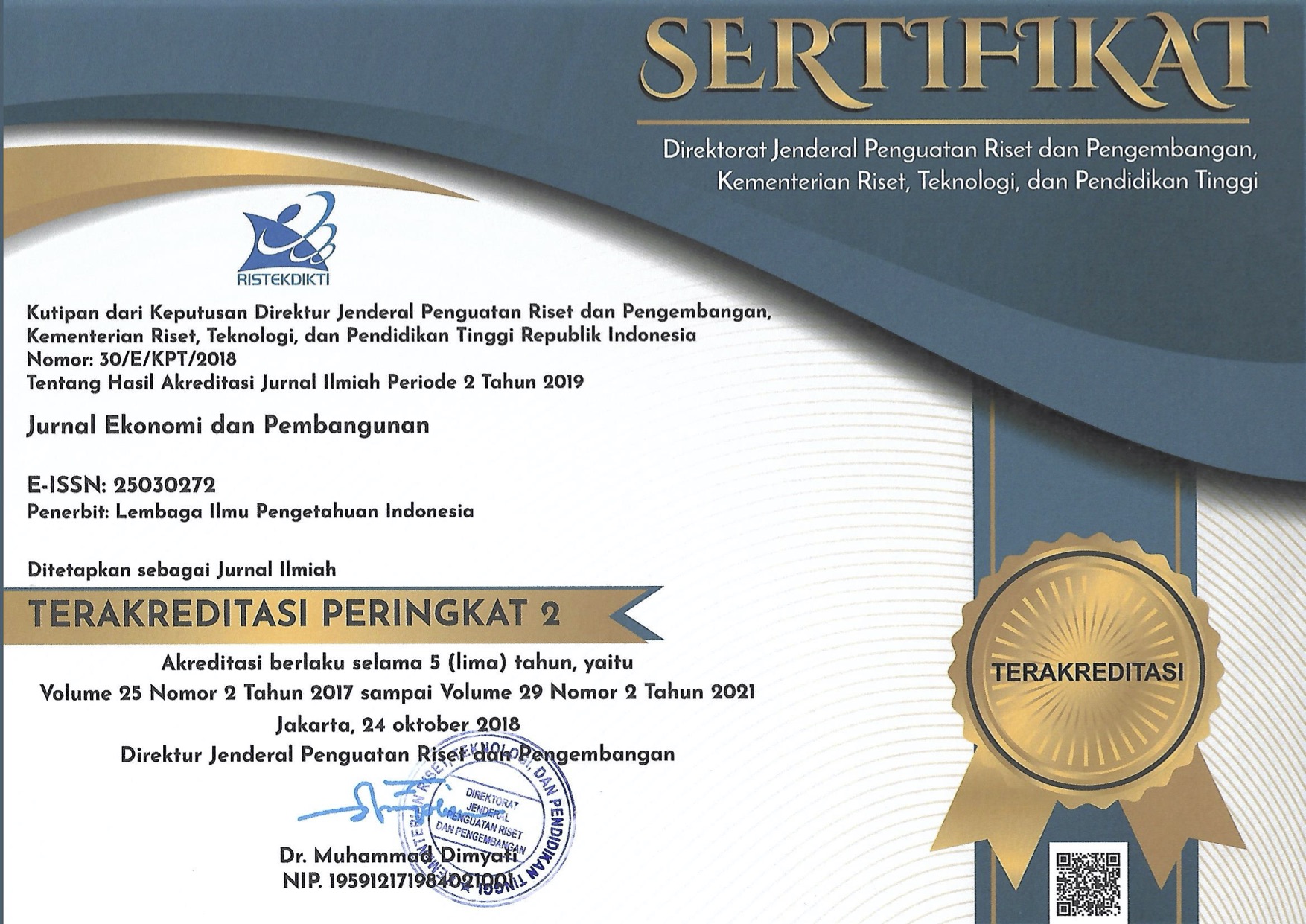GOOD GOVERNANCE AND NATURAL RESOURCE CURSE; WHICH HYPOTHESIS IS PREVAILING IN ASEAN ECONOMIES?
Abstract
This study aims to find the relevance of the natural resource curse and good governance hypothesis in ASEAN economies post-financial crises 1998. Employing Generalized Method of Moments (GMM), this study finds that good governance practices (Control of Corruption, Political Stability, and Voice and Accountability) play a role in the ASEAN economies after the great financial crisis. Thus, the hypothesis stating that good governance practices will improve economic development is confirmed. On the other hand, the observation of the natural resource curse hypothesis in ASEAN countries returns mixed results. The hypothesis states that natural resource abundance is associated with lower economic performance. This study finds that dependence on the natural resource by itself does not affect GDP. However, the natural resource curse occurs when countries with bad governance (low Control of Corruption) depend on agriculture resources. On the other hand, the natural resource becomes a blessing when the countries that rely on agriculture resources are supported with good governance practices in terms of strong Government Effectiveness, Political Stability, and Voice and Accountability. Thus, the effect of natural resources on economic development depends on the quality of governance. This paper highlights the importance of observing the natural resource and good governance in interaction instead of in isolation and the relevance of disaggregating the indicators of good governance as well as natural resources.
Downloads
References
Bakwena, M., Bodman, P., Le, T., & Tang, K. K. (2009). Avoiding the Resource Curse : The Role of Institutions. MRG Discussion Paper Series, 32, 1–33.
Baltagi, B. H. (2008). Econometrics (4th Edition). New York: Springer-Verlag Berlin Heidelberg.
Farooq, A., Shahbaz, M., Arouri, M., & Teulon, F. (2013). Does Corruption Impede Economic Growth in Pakistan? Economic Modelling,35, 622-633.
Hsiao, C. (2004). Analysis of Panel Data (2nd Edition). Cambridge: Cambridge University Press.
Huang, C. J., & Ho, Y. H. (2017). Governance and Economic Growth in Asia. North American Journal of Economics and Finance, 39(100), 260–272.
IMF. (2012). Macroeconomic Frameworks for Resource-rich Developing Countries, 1–55.
Kraipornsak, P. (2018). Good Governance and Economic Growth: An Investigation of Thailand and Selected Asian Countries. Eurasian Journal of Economics and Finance. 6. 93-106.
Mauro, P. (1995). Corruption and Growth. The Quartlerly Journal of Economics, 110(3), 681–712.
Oyinlola, M. A., Adeniyi, O. A., & Raheem, I. D. (2015). Natural Resource Abundance, Institutions and Economic Growth in Africa. African Journal of Economic and Sustainable Development, 4(1), 34.
Roberts, J. M., & Robinson, J. A. (2015). The Resource Curse - The Political and Economic Challenges of Natural Resource Wealth. NRGI Reader, (March), 71–78.
Roodman, D. (2009). How to Do xtabond2: An Introduction to Difference and System GMM in Stata. Stata Journal, 9(1), 86–136.
Sachs, J. D., & Warner, A. M. (1995). Natural Resource Abundance and Economic Growth. NBER Working Paper Series, 3, 54.
World Bank (2018). Worldwide Governance Indicator. Available at https://info.worldbank.org/governance/wgi/#home [Retrieved at September 10, 2018]
Wright, G., & Czelusta, J. (2004). The Myth of the Resource Curse. Challenge, 47(2), 6–38.
Yousefi, A. (2011). The Impact of Information and Communication Technology on Economic Growth: Evidence from Developed and Developing Countries. Economics of Innovation and New Technology, 20(6), 581–596.
Zagozina, M. (2014). The Resource Curse Paradox : Natural Resources and Economic Development in The Former Soviet Countries, Thesis, 1–70.
Copyright (c) 2020 Jurnal Ekonomi dan Pembangunan

This work is licensed under a Creative Commons Attribution-NonCommercial-ShareAlike 4.0 International License.
Terms and Conditions of Publication
1. Author's Rights and Authorities
As an author, you (or your employer or institution) may do the following:
-
make copies (print or electronic) of the article for your own personal use (not for commercial purpose), including for your own classroom teaching use;
-
make copies and distribute such copies (including through email) of the article to research colleagues, but not allowed to distribute commercially and systematically, e.g. via an email list or list server;
-
present the article at a meeting or conference and to distribute copies of the article to the delegates attending such meeting;
-
retain all proprietary rights in any process, procedure, or article of manufacture described in the work;
-
include the article in full or in part in a thesis or dissertation;
-
use the article or any part thereof in a printed compilation of your works, such as collected writings or lecture notes, and other derivative works, with full acknowledgement to JEP as the original journal publishing the article;
-
may reproduce material extracted from the article or derivative works for the author's personal use, but must consider the copyrights procedure.
All copies, print or electronic, or other use of the paper or article must include the appropriate bibliographic citation for the article’s publication in the journal.
2. Requests from Third Parties
Although authors are permitted to re-use all or portions of the article in other works, this does not include granting third-party requests for reprinting, republishing, or other types of re-use. Requests for all uses not included above, including the authorization of third parties to reproduce or otherwise use all or part of the article (including figures and tables), should be referred to P2E-LIPI by going to our website at http://ekonomi.lipi.go.id/.
3. P2E LIPI Copyright Ownership
Economic Research Center, the Indonesian Institute of Sciences (P2E-LIPI) owns the copyrights to reproduce, distribute, disseminate, translate, and other uses in accordance with the existing Laws and Regulations.
Every accepted manuscript should be accompanied by "Copyright Transfer Agreement" prior to the article publication.

This work is licensed under a Creative Commons Attribution-NonCommercial 4.0 International License.
JEP Journal by P2E-LIPI is licensed under a Creative Commons Attribution-NonCommercial-ShareAlike 4.0 International License. Permissions beyond the scope of this license may be available at http://jurnalekonomi.lipi.go.id/index.php/JEP
If you are a nonprofit or charitable organization, your use of an NC-licensed work could still run afoul of the NC restriction, and if you are a for-profit entity, your use of an NC-licensed work does not necessarily mean you have violated the term.






